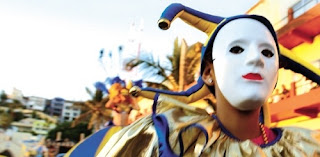"Life is a festival only to the wise."
Ralph Waldo Emerson
 |
| Rides set up at the festival on the Canary Islands |
I can't think of a better way of appreciating a new culture than by taking part in one of its festivals. You'll find that some festivals are celebrated by an entire country, while others will be unique to a single city or region, but either way festivals play an important role in a culture's identity.
 |
| Festival on Tenerife Carrying the Saint to the boats for the blessing |
That evening we went back and had dinner in the local restaurant. Afterwards we wandered around the village. The kids were having fun on the rides. There was street food available, some of which we sampled. The main event started around 8 p.m. There was a parade of people that came out of the church, they were carrying a statue of one of the saints on a special platform. They paraded it through the streets and all the locals followed. They took it down to the sea where the fishing fleet was waiting. They then performed a ceremony onboard each of the boats. It was a blessing of the fleet. The ships were all decked out with lights. After each ship was blessed it went out into the harbor and blew its horns. After all the ships were blessed there were fireworks over the bay. It was quite interesting to watch. And different from any festival I had attended here in the states.
 |
| Mardi Gras |
Mardi Gras is celebrated all over the world. The most famous of these are Venice, Rio de Janeiro and New Orleans. I suppose they are all a little bit different, although also somewhat the same. I know that the celebration has to do with the start of lent, which is again a Catholic custom. Not being Catholic, I'm not altogether sure of the whole meaning behind Mardi Gras or lent, but I can enjoy the fun of Mardi Gras.
There are some really unusual festivals that I found when researching this on the internet. Here are some of the strangest that I came up with:
| Jumping the Babies |
Villagers of Spain’s Castrillo de Murcia have taken baby blessing ceremonies to new “heights”. During the annual Corpus Christi, babies are laid down on a mattress for the ritual. Men in devil costumes jump over the babies for the little ones’ sin-cleansing, luck and good health. Recent papal orders have asked the local priests to stay away from the ritual that has been taking place since 1620.
Food Throwing Festivals
| Ivrea Orange Festival |
Spain loves food trhowing festivals and is famous for them. Probably the best know is Tomatina, which takes place in the Valencian town of Bunol. In this festival participants get together and throw tomatoes at each other. It is held on the last Wednesday of August, during the week of festivities of Buñol. Many people wear goggles during this hour of chaotic fun, as the town becomes a red river of mayhem.
Another type of food festival is on June 29th and takes place in Haro, Spain. This one though involves wine. Bring a bottle of vino and prepare to be drenched in red wine in the heart of Spain's grape-growing region. After mass, crowds flock to the hills for the battle, where white shirts are stained bright purple by the end of the morning.
| Hodaka Matsuri |
January in Japan is as cold as in other northern parts of the hemisphere. But the freezing temperature does not deter thousands of men running in the streets with nothing but a loincloth on them. Hadaka Matsuri is a festival for ritual purification held in different forms across Japan. In Inazawa, men in loin cloths struggle to touch a naked man called Shin-otoko for good luck. These naked festivals are fun events but with undertones of spiritual significance.
Color Throwing Festival
| Hindo Color Throwing Festival |
| Monkey Buffet |
As the name suggests, this festival is a huge feast laid down for primates of Lopburi, Thailand. Tons of fruits and vegetables are laid by devotees in honor of Hanuman, the monkey God. What follows next is absolute mayhem as hordes of monkeys swarm the site, start attacking the food piles and interacting with spectators. The festival over the years has become more lavish and has put this small province on the world tourism map.
Fish Swallowing Festival
| Man swallowing live fish in Belgium |
 |
| Orange is the color for the Queen's Day Festivals |
Although their queen's birthday is really during the winter, she celebrates it on April 30th, the country's official "Queen's Day" since 1949. Orange is the national color, and the streets become a sea of fluorescent wigs, feather boas, and body paint, as crowds gather in the plazas and on boats in the canals. Amsterdam is the center of the outdoor party, with many live music acts, but you will find similiar smaller festivals all over The Netherlands on this day.
These are just a few of the festivals that I found. There are many more. If you are traveling and stumble across a local festival, take time to check it out. However, if they are throwing food, you might want to steer clear, unless you are wearing clothes you don't mind having ruined. You really do learn alot about a culture and the people by attending a local festival. So have any of you attended an unusual festival? I would love to hear about it, if you have.

No comments:
Post a Comment